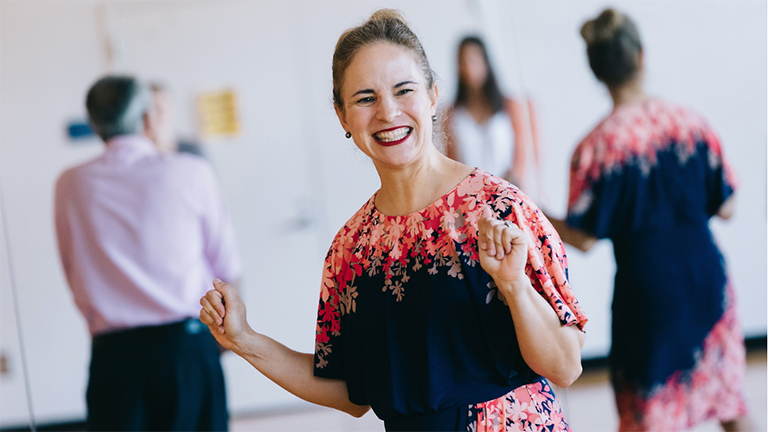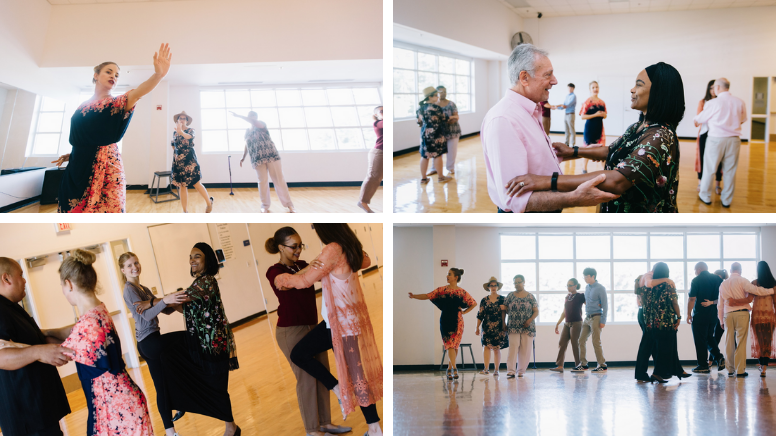Since the age of fifteen, Madeleine Hackney, PhD, was determined to dance professionally. After diligently training during her junior and senior years in high school, she was accepted to the NYU Tisch School of the Arts Dance Performance BFA program and went on to perform for eleven years before pursuing movement science in grad school.
Now, as a research scientist at the Center for Visual and Neurocognitive Rehabilitation at the Atlanta VA Medical Center and an associate professor in the Division of General Medicine and Geriatrics, Hackney combines her passion for dance with her desire to help patients with Parkinson’s Disease. Her research works to determine safe and effective dance, movement, and exercise-based interventions to improve motor, cognitive, and psychosocial behavioral health in older adults with neurodegenerative disease.
Hackney is most known for her adapted Argentine tango research program that was initially tested for people with Parkinson’s Disease, but has since been translated to other populations. Most recently, with the COVID-19 pandemic, Hackney’s team has been exploring telehealth options to continue to help patients.
Even though much of her work is with older patients, Hackney believes dance can enhance the lives of everyone, especially during a time when many people are working from home and remain sedentary for much of the day.
While it might not be possible to take an in-person dance class right now, Hackney says the public can still enjoy partnered dance with their families, roommates, etc. “People might have partners they can dance with at home. Lots of us are dancing with our kids,” she said. Another option is to utilize resources such as YouTube to find free dance lesson videos, which can be enjoyed solo or together with your household.
Hackney says, “There’s always ‘Dance Break’ time. Ask Alexa to put on a favorite song, and dance to it like nobody’s watching.”
In addition to participating in dance, Hackney stresses the importance of embracing different forms of movement and staying active during this challenging time. She says there are many ways to incorporate more movement into your day, while still prioritizing safety.
“There are plenty of things you can do, as long as you follow the guidelines from our health professionals here at Emory and the CDC,” advises Hackney. “You can go for short, brisk walks during the day. Consider taking a call while taking a walk outside, to get some extra steps in. Participate in Blomeyer’s [virtual] free classes offered several times a day, or the hundreds or thousands of options of classes on YouTube. You could do a set of push ups or dips in a chair. Try to get a ‘balance’ of strengthening, cardio, and stretching exercises in your day. You could try standing up and sitting down as many times as you can in thirty seconds, a few times a day. See if you get better over a couple of weeks by charting your progress. Running up and down the stairs is an option. And of course, I believe that we are not just what we eat, but also what we ‘do.’ Try to hold on to any special skills you may have as an adult, for example, can you do a cartwheel? Well, keep on doing them. It’ll keep you young.”
Hackney also wants the public to know what while everyone needs exercise for a high quality life, that fitness plan will look different for everyone.
“To have a strong and healthy immune system, we all need to get enough exercise. What constitutes ‘enough’ is still a little up for debate, but even several quick fifteen minute breaks in the day to do some movement, or getting your jam on with your favorite dance music can really boost your overall health. According to the ACSM for older adults, those aged sixty-five and over, that’s one hundred-fifty minutes per week of moderate aerobic exercise. Younger people should get at least that amount. Do what you need to do to feel safe, and please wear a mask, but also get the exercise you need. I am happy to brainstorm with anyone to find an exercise routine that will fit into their life and their ‘new normal.’”
Watch the video below to follow along with Hackney as she leads a simple dance exercise routine:



Be the first to comment on "Madeleine Hackney, PhD, shares the power of dance during COVID-19"